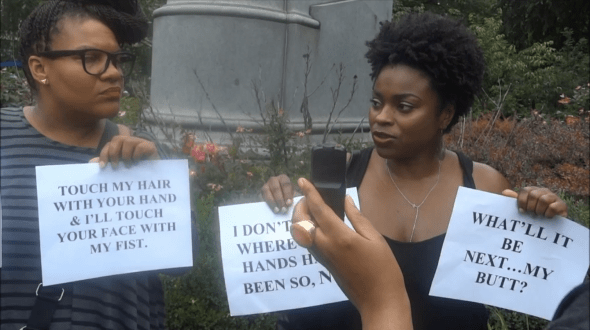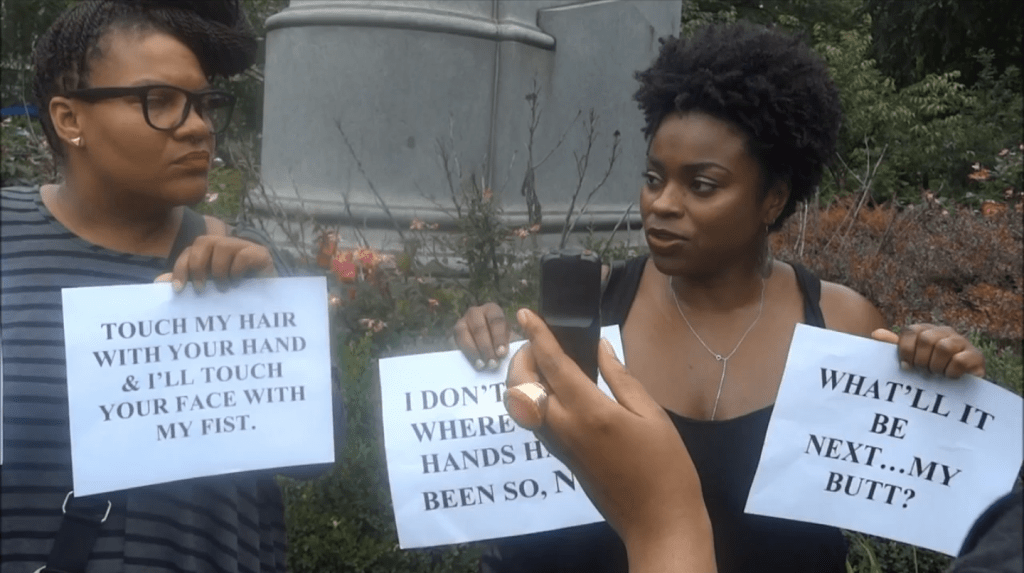Ramelcy Uribe is a student from Haverford College from the Bronx, New York. Her internet presence is centralized here.
Simply put, the “Natural Hair Movement” for Black womyn from all across the Pan-African diaspora has become our re-introduction to rocking our natural curls and naps. For many, it’s the first time since our childhood or youth (although this is not true for all naturalistas), but more critically, it is a departure from Eurocentric beauty ideals of long, straight, fine hair, an explicit embracing of our African roots (pun intended), and a celebration of our selves.
For me, I sort of fell into the whole movement. It was not something I had really thought about until a year ago when I decided to cut my hair, as the idea of Dominican womyn with hair dryers attempting to straighten my short hair in the blistering heat of the summer was definitely enough for me to say goodbye to the chemical straighteners and painful blowouts. Although I had imagined “going natural” to be simple, I was totally wrong. My natural hair required more care and products than my straight hair, and for the first time in my life, everyone seemed to have an opinion on it, from friends to family members to absolute strangers.

Suddenly, my natural hair was everyone’s business. Both fortunately and unfortunately, I was not the only womon to feel this way; Black womyn with natural hair often deal with apprehension from others, touching from strangers, and even discrimination. Over this last year of being natural, I have gained greater perspective into this movement and what it means for different womyn, including myself.
Being in this movement has made me interested in learning more about diversity within the very community, so when I read about the “You Can Touch My Hair” interactive public exhibit at Union Square, I was hyped to go experience it for myself. The exhibit brought up a lot of mixed feelings from the crowd, who were expressing three “You Can Touch My Hair” models for celebrating natural hair—different levels of openness with themselves and others to allow strangers to feel their hair. Yet, another side of me questioned if by putting the natural hair of these Black womyn on “display” are we further “othering” their hair as if it is something that has to be explained and presented to the general public because it is outside “the norm.” Also, why stop with hair?
Would we soon have to put darker skin complexions, wider hips, larger butts, and different noses on display to be gawked at and touched to show people are different?
Some of the womyn present thought the exhibit to be positive in opening dialogue about natural hair and how people may perceive it, but many more expressed interest when an opposing group arrived with their own signs. Radha Blank and Stacey Sargeant were the womyn in the video who shared their outrage about the entire exhibit. The two womyn held signs that said “I am not your Sarah Baartman,” “I don’t know where your hands been so, NO,” and “Touch my hair with hand & I’ll touch your face with my fist.” They did not seem to have a problem with the conversation about natural hair, but rather how the exhibit’s “point of entry and who were the touchers and the touchees” in the words of Radha. It seemed like many womyn were excited with the arrival of Radha and Stacey, including my own friend who is also Afro-Latina and natural, agreeing that the “petting zoo feel” of the entire exhibit was both objectifying and exotifying. “People should never be put on display because they are different.” Many womyn agreed that by just putting the natural hair of these black womyn on display, there was no larger education or acceptance occurring. It was just that, natural hair on display and nothing more.
Some people ask “what’s the big deal, it is just hair,” but those people, like the exhibit, fail to acknowledge natural hair is always political because of its automatic stance against European standards of beauty and normality. It is a stand against years of being told we are inferior because of our heritage, because of our physical attributes, and simply because of who we are.
Watching the responses of the exhibit continue to roll in show how the Natural Hair Movement is not merely a choice of style we all happen to share, but an actual community with opinions, political drives, and more importantly, it is as diverse as our hair textures.

Leave a reply to Normal Guy Cancel reply